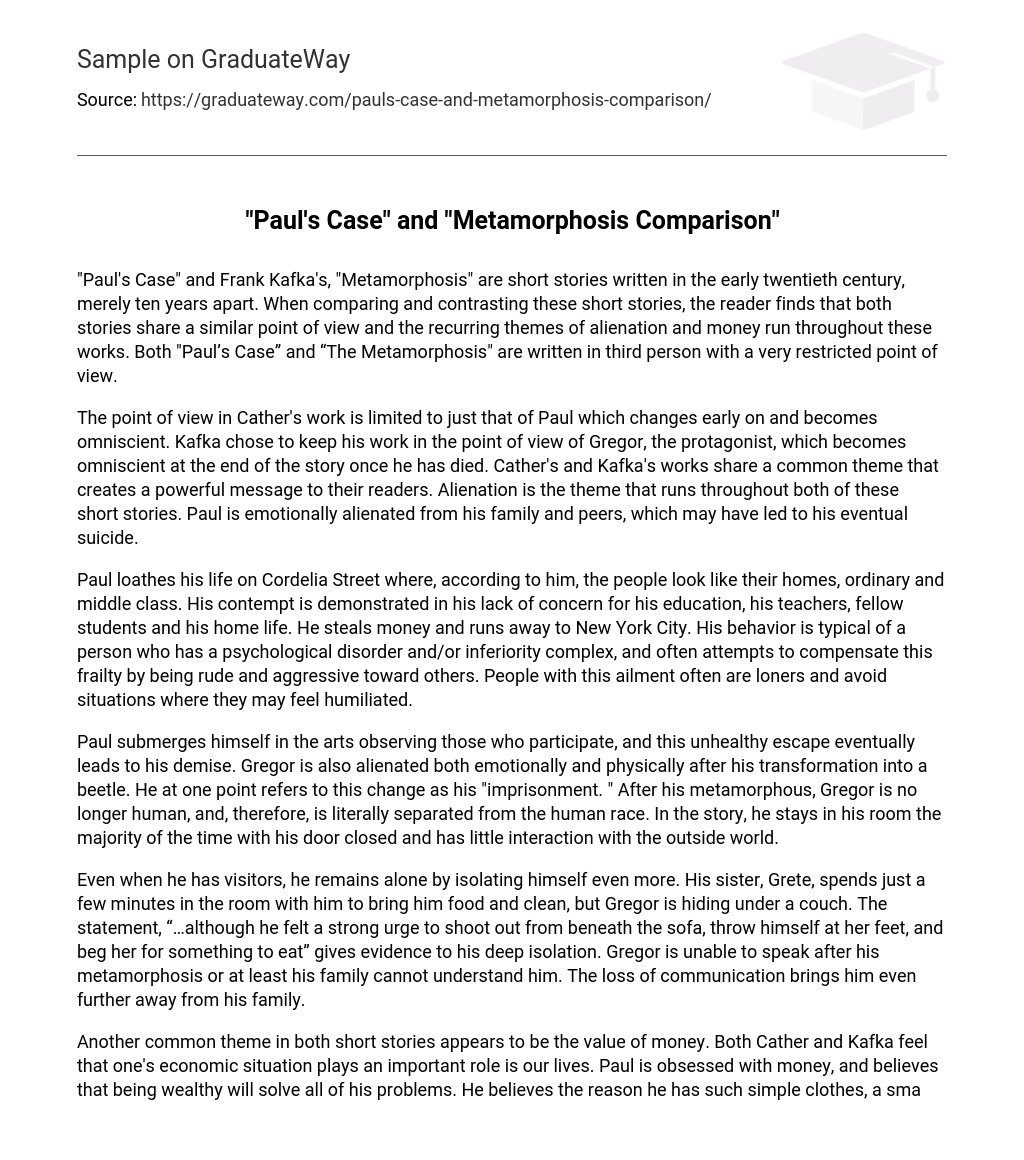In the early twentieth century, two short stories titled “Paul’s Case” and “Metamorphosis” were written within a ten-year period. When examining these stories, it is evident that they share a common viewpoint and revolve around the recurring themes of alienation and money. Both stories are written in third person with a limited perspective.
Both Cather’s and Kafka’s works share a similar point of view, where limited perspectives gradually transition into omniscience. In Cather’s work, this limited perspective belongs to Paul initially but later transforms into an all-knowing narrative voice. Conversely, Kafka maintains the viewpoint of Gregor, the protagonist, until his demise when it shifts to an omniscient perspective. A shared theme in these short stories is alienation, which effectively communicates a poignant message to readers. Paul undergoes emotional alienation from both his family and peers, possibly influencing his eventual suicide.
Paul despises his existence on Cordelia Street, where he believes the individuals resemble their houses – average and middle class. His disdain is evident in his indifference towards his schooling, instructors, peers, and family life. He unlawfully acquires money and flees to New York City. His conduct is representative of someone afflicted with a psychological disorder and/or inferiority complex, frequently attempting to compensate for these weaknesses by displaying impolite and hostile behavior towards others. Individuals with this affliction typically isolate themselves and steer clear of situations that may bring about humiliation.
Both Paul and Gregor undergo alienation in their individual narratives. Paul delves into the realm of the arts, observing those engaged in it, which ultimately brings about his downfall. Likewise, Gregor experiences emotional and physical isolation upon transforming into a beetle, describing this transformation as his “imprisonment.” Consequently, due to this metamorphosis, Gregor ceases to be human, resulting in a literal detachment from humanity. Throughout the tale, he remains confined within his room with limited interaction with the external world and often keeps his door shut.
Despite having visitors, Gregor isolates himself even more by remaining alone. His sister, Grete, briefly enters the room to bring him food and clean, but Gregor hides under a couch. The statement, “…although he felt a strong urge to shoot out from beneath the sofa, throw himself at her feet, and beg her for something to eat” serves as proof of his profound isolation. Following his metamorphosis, Gregor is unable to speak or, at the very least, his family cannot comprehend him. This loss of communication further estranges him from his family.
Another common theme in both short stories appears to be the value of money. Both Cather and Kafka emphasize the significance of one’s economic situation in our lives. Paul is fixated on money and believes that being wealthy will resolve all his issues. He attributes his simple attire, modest dwelling, and dull companions to his poverty-stricken upbringing. He strongly feels that he deserves financial prosperity but is unwilling to put in the effort to attain it. His desire is to become rich swiftly.
Paul despises the fact that his acquaintances must work diligently to make ends meet and save for a better future. He feels as if he was born into the wrong family, prompting him to steal a sum of one thousand dollars in order to pursue his desired way of life. Paul possesses an exaggerated sense of the importance of wealth. He finds himself envious of those who are able to frequent theaters, luxuriate in extravagant hotels, travel across the Mediterranean via yacht, and own splendid palaces in Venice. While in New York, Paul firmly asserts that money holds paramount significance; it serves as the barrier separating everything he detests from everything he craves.
This statement demonstrates Paul’s belief that having money in his possession would make his life more luxurious and ultimately fulfill him. Money is a recurring theme in “The Metamorphosis” as Gregor resents being responsible for supporting his family because of their accumulated debt. He despises his job as a travelling salesman, finding it meaningless and contributing to his detachment from his family since he is rarely home. Ironically, once Gregor undergoes his transformation into a beetle, he becomes a kind of parasite and must rely on his family for his basic necessities.
Before he turned into an insect, he was the sole provider for his family. However, when he lost his ability to support them, his father, mother, and sister started working. The narrator describes the family’s occupations as follows: “His father fetched breakfast for junior bank clerks, his mother dedicated herself to making underwear for strangers, and his sister continually served customers behind the counter. Despite all their efforts, they were unable to do anything more than that.”
The Samsa family appears to have capitalized on Gregor’s human form. With Gregor now transformed into a beetle and unable to contribute, his parents and sister were compelled to find employment. In “Paul’s Case” and “Metamorphosis,” both tragic tales revolve around young men who ultimately meet their demise. Their deaths stem from their profound alienation, whether tangible or perceived. Cather and Kafka share a common message concerning the significance of maintaining harmonious family bonds and the precariousness of losing them due to social and familial detachment.





